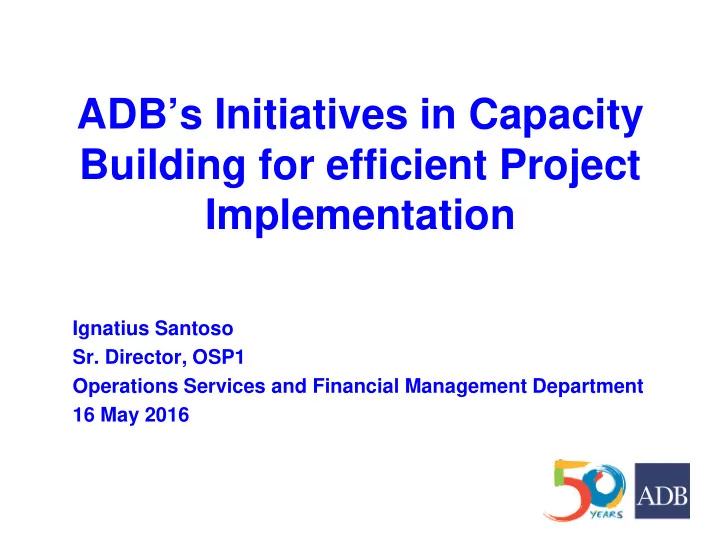

ADB’s Initiatives in Capacity Building for efficient Project Implementation Ignatius Santoso Sr. Director, OSP1 Operations Services and Financial Management Department 16 May 2016
29 Resident Missions & 3 Rep Offices HQ in Manila (Tokyo; Frankfurt; Wash DC) Est. ADB’s 1966 Presence • Total Capital Stock: $188 billion from 1 Jan 2017 (Paid-in and Retained I ncome of $53 billion; Callable Capital of $135 billion)
ADB Operations Annual operations: $27.17 billion (2015) Country Active Portfolio Total Lending ($ billion) ($ billion) Uzbekistan 3.4 4.2 Kazakhstan 2.1 3.9 Azerbaijan 1.5 2.2 Georgia 0.93 1.9 Tajikistan 0.80 0.80 Armenia 0.69 0.69 Kyrgyz Republic 0.55 0.55 Turkmenistan 0.12 0.12
ADB Operations Main Instruments Loans and Grants Technical Assistance Cofinancing Operations Private Sector Operations Lending Sovereign engagement with Governments Non-Sovereign lending to private/corporatized enterprises in developing countries through loans, equity investments, guarantees AAA credit rating helps mobilize funds for development activities
ADB’s Strategic Approach Towards Capacity Building Project interventions Support through technical assistance programs Common Initiatives with MDBs
Project Interventions Procurement risk assessments by ADB provide upfront information on bottlenecks to procurement performance at country and sector level Procurement staff provide hands on support for high risk projects, including agreeing the master bidding documents Executing agency staff attend customized procurement clinics and training on good practices in public procurement and consultant selection
Technical Assistance Supports Specific TA to support procurement reforms including procurement professionalization and capacity building, example: Strengthening Public Procurement Processes, Indonesia Asia Pacific Public E-procurement Network (APPeN) Capacity Building for Project Management Unit Professionalization, Vietnam Workshops and Seminars conducted across Asia Pacific and in ADB HQ
Technical Assistance Supports – Ongoing • TA8665-REG Support on Procurement Capacity Building • TA 8555 REG: Improving Procurement in South Asia • TA 8426 BAN: Capacity Building for Portfolio Management • TA 7593 IND: Capacity Development for Project Implementation • TA 8286 NEP: Enhancing Portfolio Performance • TA 8562 SRI: Capacity Development for Project Implementation • TA 8798 SRI: Improving Project Readiness and Portfolio Mgt. • TA 9086-REG: Building Project Implementation Capacities in the Pacific • TA 8806-VIE :Support to Improve Portfolio Performance and Aid Effectiveness • TA 8188 CAM: Towards Country Systems in Procurement and Financial Mgt.
TA 7653: Strengthening National Public Procurement Processes in Indonesia Key outputs: Improvement of the National Public Procurement Agency’s (NPPA) institutional capacity; Better-trained and more professional procurement personnel; Improvement of public awareness of NPPA roles and outputs; and Operationalization of integrated national e-procurement system.
TA 7653: Strengthening National Public Procurement Processes in Indonesia Certification and Training Program Types of Procurement Professionals Certification Basic certification Professional certification Certification validity: 4 years Types of Procurement Training Basic Procurement Training Advanced Procurement Training for Procurement Professionals or Procurement Functional Staff Technical/Thematic Training e-Audit/e-Probity Audit e-Tendering/e-Purchasing, Procurement Planning Developing Terms of Reference Documents
TA 7653: Strengthening National Public Procurement Processes in Indonesia Achievements and Targets 15,710 staff throughout Indonesia has been trained as of 2014 Work as: procurement staff, bid evaluation committee, procurement professional functional staff at the procurement services units, project managers (PPK), directors of the programs, CEO of the departments responsible for bigger national programs Total requirement: 104,000 staff
Common Initiatives with other MDBs TA 8297-KGZ support on implementing the e-procurement system in Kyrgyz Republic; Outcomes – Transparency and efficiency of the public procurement system improved, establish a phased rollout for the e-procurement system, improving EAs’ technical skills for e-procurement TA 7752-NEP: Strengthening Public Procurement Management and Portfolio Performance; Outcomes – (i) e-GP system developed; (ii) knowledge partnership with development partners promoted; (iii) conferences, seminars, workshops, and other knowledge sharing activities carried out; and (iv) e-GP training organized TA 7244-PHI: Strengthening the Philippine Government Electronic Procurement System; Outcomes – (i) implementation of Virtual Store the facilitates online ordering of common-use goods, supplies and materials; (ii) development and use of e-Payment facility for Virtual Store; (iii) e-Bidding in 2 stages; and (iv) launch of e-Learning site with users exceeding 4,300
ADB's own procurement accreditation program PASS (Procurement Accreditation Skills Scheme) ADB’s flagship staff development program PASS verifies that staff has attained the required level of professional knowledge and judgment to correctly apply ADB-specific procurement policies and oversight processes. Two types: Procurement and Consultant Selection This is the backbone of the risk based delegated procurement arrangements practiced in ADB
PASS – accreditation track
Success Factors PASS built into staff learning and development program Regular and fast track accreditations - mix of online, workshop and mentoring Improved professional opportunities for staff that complete PASS accreditation Regional Department wise targets, monitored by ADB HR department Program is consistent with ADB's vision to improve public procurement efficiency and effectiveness
Typical country procurement capacity building models Focus in many countries remains on training existing public service staff on procurement rules New approaches sometime involve building a career (professional) stream within the public service – limited sustainability Some countries often seek certification capacity by partnering with external professional bodies
Challenges for DMCs Traditional education system Traditional public/ civil services that relies on generalists Limited resources – time, human, monetary Traditional compliance oriented procurement systems and approaches Lack of understanding of Senior Government Officials Staff turnover is high Defining or benchmarks to measure effectiveness of such programs continues to be a challenge
Recommend
More recommend